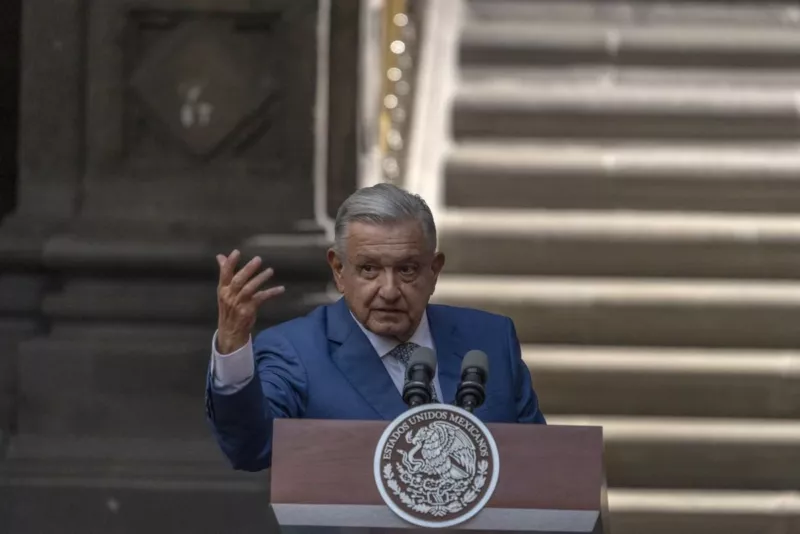
In the winter of 1170, in his Normandy castle, King Henry II was furious that Thomas Becket, archbishop of Canterbury, had excommunicated several of his loyal bishops. He is said to have exclaimed, “Will no one rid me of this troublesome priest?” Hearing this, four knights traveled to Canterbury, where they murdered Becket. When the ensuing scandal broke, Henry insisted his statement had been misunderstood. He had not meant it as an order.
A similar story is now playing out in Mexico. From the National Palace, President Andrés Manuel López Obrador, who is not yet an absolute ruler but appears to aspire to be one, is furious with his critics, almost all of them journalists, writers and intellectuals. He regularly makes public statements denouncing them, and does not hesitate to give the individuals’ full names, in statements that could easily be “misunderstood”. He has done so innumerable times, before audiences of millions.
López Obrador has a show called “La Mañanera”, which can be translated as “early riser”. It went on the air on Dec. 3, 2018, two days after he assumed office. Every morning from 7 a.m. to 10 a.m., five days a week, the president gives a simulated news conference, with very few independent journalists allowed to attend or speak. The president’s spokesperson also rarely speaks, but instead prepares questions and doles them out to the trusted journalists. It is the president who speaks.
His speeches are littered with ad hominem attacks. Five years ago, writer Gabriel Zaid compiled a list of López Obrador’s insults against anyone he wished to discredit. At the time, the list numbered 80. Today, it is surely longer.
López Obrador also indulges in slander and defamation. Anyone who criticizes him is part of a conspiracy aimed at his overthrow. All his critics are corrupt, driven only by material interest. He frequently refers to his critics as “enemies of the people” and publicly displays their personal information — tax documents, property, photos, videos — to reveal their income and insinuate that they came by it through disreputable means.
Among a group of critics considered “enemies”, I have been among the most attacked. To date, I have been mentioned — insulted — 298 times. Although I have been an outspoken critic of every Mexican government since 1970, López Obrador has accused me of having sold myself to these previous governments and of conspiring to bring them back to power.
López Obrador has resented me ever since I publicly criticized him a month before the 2006 elections (which he lost by a margin of 0.58 percent). He has accused me of “wanting to crush the people”, and of “causing huge damage to Mexico”. He has accused me of “conducting a strategy” to overthrow him. He said I have “asked President Biden to intervene in Mexico” to appoint an ambassador (presumably me) to prepare a coup. Not long ago, he urged the public to find my home address so that he could reveal it to the media.
The president maintains that his attacks are legally unobjectionable. Under Mexican law, public figures can expect to be subject to greater scrutiny than private citizens. This scrutiny might be severe, aggressive and even offensive. The threshold of acceptable scrutiny is meant to be directly proportional to the person’s relevance in public life. All of López Obrador’s troublesome critics are public figures. So, the president reasons, all this is fair game.
But the law is meant to shield free speech, not give license to the government to stifle it. The president personally attacks his critics from the seat of executive power and uses public money to do so. His messages and attacks are integral parts of official communiques and government broadcasts, which in turn multiply exponentially on social media. López Obrador’s persecution is aimed at inhibiting liberty.
Are there legal means of recourse? In theory, yes. In practice, no. A feature of the Mexican constitution that has long been a source of pride is the “Amparo”, or writ of protection, which guards individuals against abuses of government authority. If we, the aggrieved, were to invoke this, we could point to the infringement of various human rights set out in our constitution — to due process and a fair trial, to a private life, to freedom of expression, to disseminate one’s ideas and the right of reply.
We could then turn to Mexico’s National Human Rights Commission, and in turn refer our cases to international institutions, which might bring about some sort of protection. In practice, however, the commission is entirely subservient to the government. And even if an international body were to give a favorable ruling, the president would probably still not comply.
In full view of the world, López Obrador is leading us down the path to a single-party state under the control of a single man. The cause of liberty is what stands in the way of any attempt to put an end to democracy. We troublesome critics never tire of pointing this out.
López Obrador said that watching the work of journalist Ciro Gómez Leyva could give you “a brain tumor”. An attempt was made on Gómez Leyva’s life the very same week. Those behind the attempt have never been found — and in all probability, never will be. The president declared that “it could have been a self-attack — not because he fabricated it, but someone did it in order to affect us”.
It might only be a matter of time before one of López Obrador’s critics is murdered. At that point, the president will say that it was all a plot to bring him down. Or, like King Henry II, he might say that it was all just “a misunderstanding”.
Enrique Krauze is a Mexican historian. He is the author of “Mexico: Biography of Power” and “Redeemers: Ideas and Power in Latin America”.
